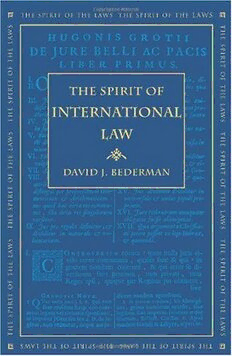
The Spirit of International Law PDF
294 Pages·2002·9.27 MB·English
Most books are stored in the elastic cloud where traffic is expensive. For this reason, we have a limit on daily download.
Preview The Spirit of International Law
Description:
As our society becomes more global, international law is taking on an increasingly significant role, not only in world politics but also in the affairs of a striking array of individuals, enterprises, and institutions. In this comprehensive study, David J. Bederman focuses on international law as a current, practical means of regulating and influencing international behavior. He shows it to be a system unique in its nature—nonterritorial but secular, cosmopolitan, and traditional. Part intellectual history and part contemporary review, The Spirit of International Law ranges across the series of cyclical processes and dialectics in international law over the past five centuries to assess its current prospects as a viable legal system. After addressing philosophical concerns about authority and obligation in international law, Bederman considers the sources and methods of international lawmaking. Topics include key legal actors in the international system, the permissible scope of international legal regulation (what Bederman calls the "subjects and objects" of the discipline), the primitive character of international law and its ability to remain coherent, and the essential values of international legal order (and possible tensions among those values). Bederman then measures the extent to which the rules of international law are formal or pragmatic, conservative or progressive, and ignored or enforced. Finally, he reflects on whether cynicism or enthusiasm is the proper attitude to govern our thoughts on international law. Throughout his study, Bederman highlights some of the canonical documents of international law: those arising from famous cases (decisions by both international and domestic tribunals), significant treaties, important diplomatic correspondence, and serious international incidents. Distilling the essence of international law, this volume is a lively, broad, thematic summation of its structure, characteristics, and main features.
See more
The list of books you might like
Most books are stored in the elastic cloud where traffic is expensive. For this reason, we have a limit on daily download.
